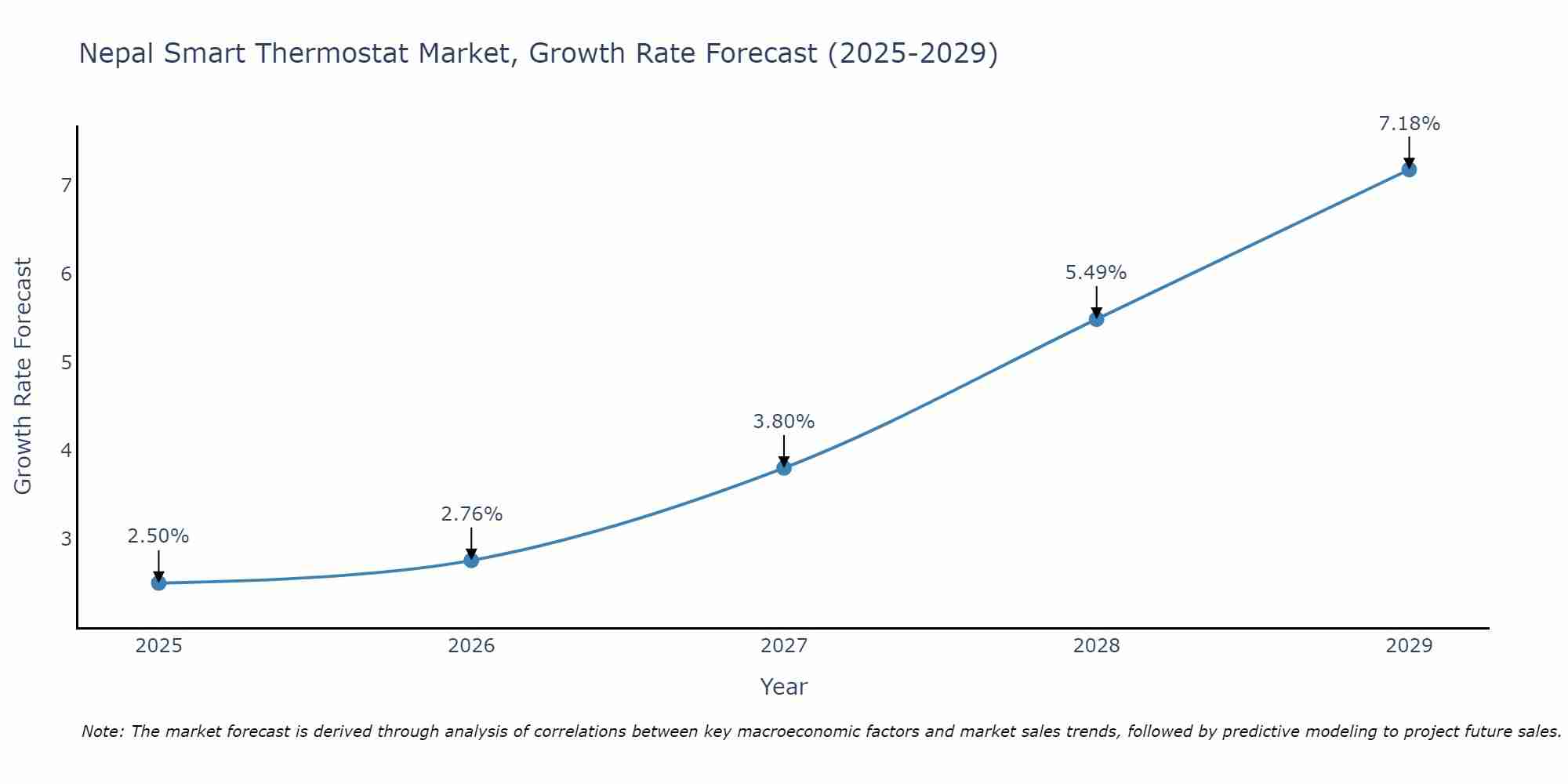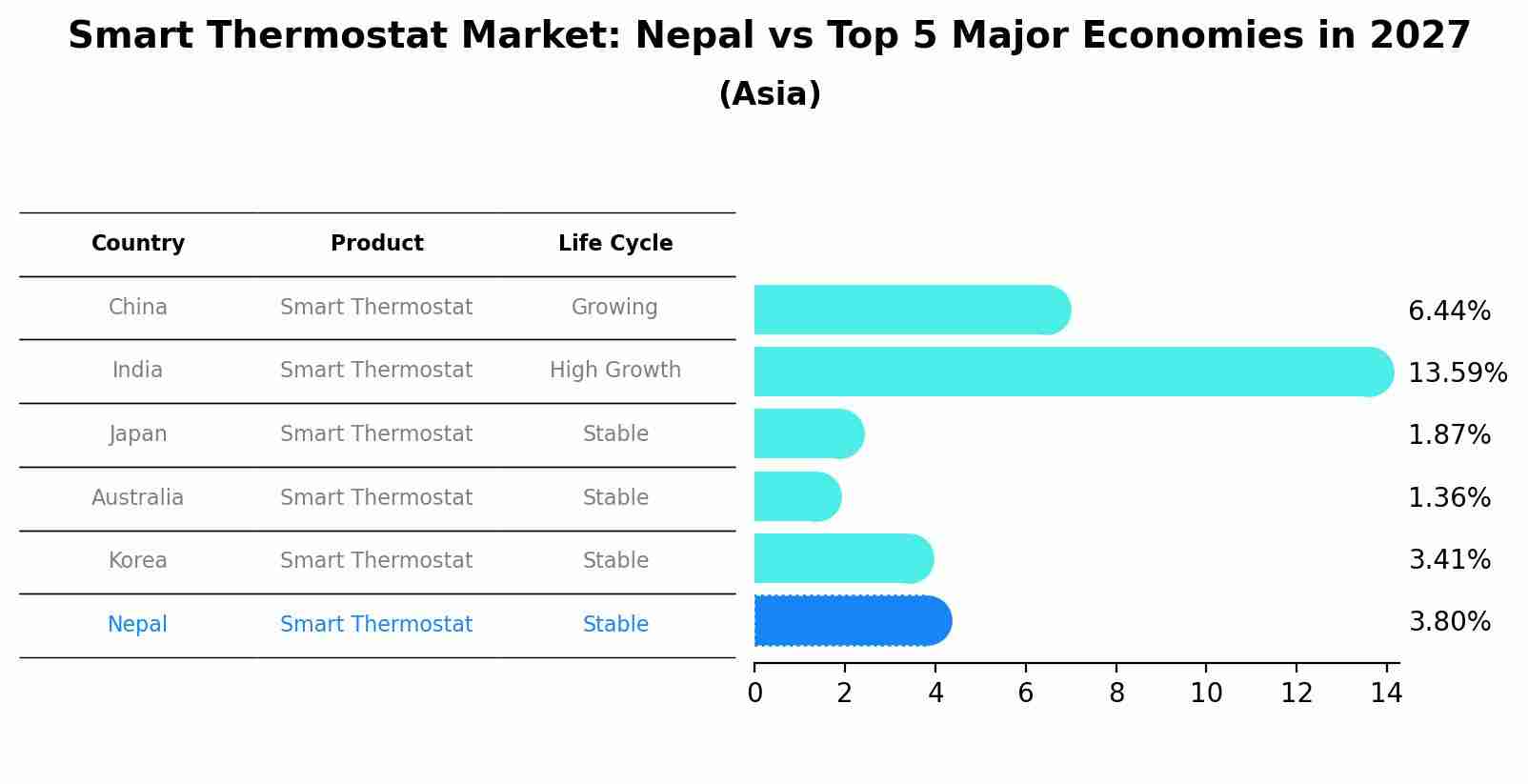Nepal Smart Thermostat Market (2025-2031) Outlook | Share, Growth, Trends, Forecast, Size, Revenue, Companies, Analysis, Industry & Value
| Product Code: ETC369516 | Publication Date: Aug 2022 | Updated Date: Jul 2025 | Product Type: Market Research Report | |
| Publisher: 6Wresearch | Author: Summon Dutta | No. of Pages: 75 | No. of Figures: 35 | No. of Tables: 20 |
Nepal Smart Thermostat Market Size Growth Rate
The Nepal Smart Thermostat Market is poised for steady growth rate improvements from 2025 to 2029. From 2.50% in 2025, the growth rate steadily ascends to 7.18% in 2029.

Smart Thermostat Market: Nepal vs Top 5 Major Economies in 2027 (Asia)
By 2027, Nepal's Smart Thermostat market is forecasted to achieve a stable growth rate of 3.80%, with China leading the Asia region, followed by India, Japan, Australia and South Korea.

Nepal Smart Thermostat Market Synopsis
The Nepal Smart Thermostat Market is experiencing steady growth due to increasing awareness about energy efficiency and the adoption of smart home technologies. Consumers are increasingly seeking ways to optimize their energy consumption and reduce utility costs, driving the demand for smart thermostats in the country. Key players in the market are focusing on product innovation, such as integration with smart home systems and voice control features, to stay competitive. The market is also witnessing a rise in government initiatives promoting energy efficiency, further boosting the adoption of smart thermostats. Overall, the Nepal Smart Thermostat Market is poised for continued growth as consumers seek ways to enhance comfort and save on energy expenses.
Nepal Smart Thermostat Market Trends
The Nepal Smart Thermostat Market is experiencing growth driven by increasing awareness of energy efficiency and smart home technologies among consumers. The trend towards sustainable living and the desire to reduce energy costs are key factors contributing to the adoption of smart thermostats in Nepalese households. The market is witnessing a shift towards Wi-Fi-enabled smart thermostats that offer remote control and energy monitoring features. Additionally, the growing availability of smart home devices and the rise in internet penetration in Nepal are further fueling the demand for smart thermostats. As consumers seek ways to optimize their energy consumption and enhance convenience in managing their homes, the Nepal Smart Thermostat Market is expected to continue its upward trajectory in the coming years.
Nepal Smart Thermostat Market Challenges
In the Nepal Smart Thermostat Market, several challenges are faced that hinder its growth and adoption. One major challenge is the limited awareness and understanding of smart thermostat technology among consumers. Many individuals in Nepal may not be familiar with the benefits and functionalities of smart thermostats, which can lead to hesitancy in investing in such products. Additionally, the high initial cost of smart thermostats compared to traditional thermostats can be a barrier for price-sensitive consumers. Furthermore, issues related to compatibility with existing heating and cooling systems, as well as concerns about data privacy and security, also pose challenges in the market. Overall, educating consumers about the advantages of smart thermostats, addressing pricing concerns, and ensuring compatibility and security can help overcome these challenges in the Nepal Smart Thermostat Market.
Nepal Smart Thermostat Market Investment Opportunities
The Nepal Smart Thermostat Market presents promising investment opportunities due to the increasing focus on energy efficiency and smart home technology adoption in the country. With the growing awareness about climate change and the need to reduce energy consumption, there is a rising demand for smart thermostats that offer remote access, energy-saving features, and personalized temperature control. Investors can capitalize on this trend by investing in smart thermostat manufacturing companies, distribution channels, or partnering with local HVAC service providers to offer smart thermostat installation services. Additionally, collaborations with government initiatives promoting energy efficiency and sustainable living can further enhance market penetration and profitability in the Nepal Smart Thermostat Market.
Jordan Agar Market Government Policies
The Nepal government has implemented various policies to promote energy efficiency and sustainability in the Smart Thermostat Market. These policies include incentives such as subsidies and tax breaks for consumers adopting smart thermostat technology, as well as regulations mandating the use of energy-efficient devices in new construction projects. Additionally, the government has launched public awareness campaigns to educate the population about the benefits of smart thermostats in reducing energy consumption and lowering utility bills. Overall, the government`s initiatives aim to drive the adoption of smart thermostat technology to enhance energy efficiency and contribute to environmental conservation efforts in Nepal.
Nepal Smart Thermostat Market Future Outlook
The future outlook for the Nepal Smart Thermostat Market is promising, as the increasing adoption of smart home technologies and the growing awareness of energy efficiency are driving the demand for smart thermostats in the country. With a focus on sustainability and energy savings, consumers are looking for ways to optimize their home heating and cooling systems, making smart thermostats an attractive option. Additionally, government initiatives promoting energy efficiency and the rise of smart cities in Nepal are expected to further propel the market growth. As technology continues to advance and become more affordable, the smart thermostat market in Nepal is likely to witness steady growth in the coming years, offering opportunities for both domestic and international manufacturers to expand their presence in the market.
Key Highlights of the Report:
- Nepal Smart Thermostat Market Outlook
- Market Size of Nepal Smart Thermostat Market, 2024
- Forecast of Nepal Smart Thermostat Market, 2031
- Historical Data and Forecast of Nepal Smart Thermostat Revenues & Volume for the Period 2021 - 2031
- Nepal Smart Thermostat Market Trend Evolution
- Nepal Smart Thermostat Market Drivers and Challenges
- Nepal Smart Thermostat Price Trends
- Nepal Smart Thermostat Porter's Five Forces
- Nepal Smart Thermostat Industry Life Cycle
- Historical Data and Forecast of Nepal Smart Thermostat Market Revenues & Volume By Type for the Period 2021 - 2031
- Historical Data and Forecast of Nepal Smart Thermostat Market Revenues & Volume By Wireless for the Period 2021 - 2031
- Historical Data and Forecast of Nepal Smart Thermostat Market Revenues & Volume By Wireless for the Period 2021 - 2031
- Historical Data and Forecast of Nepal Smart Thermostat Market Revenues & Volume By End-User Vertical for the Period 2021 - 2031
- Historical Data and Forecast of Nepal Smart Thermostat Market Revenues & Volume By Residential for the Period 2021 - 2031
- Historical Data and Forecast of Nepal Smart Thermostat Market Revenues & Volume By Commercial for the Period 2021 - 2031
- Nepal Smart Thermostat Import Export Trade Statistics
- Market Opportunity Assessment By Type
- Market Opportunity Assessment By End-User Vertical
- Nepal Smart Thermostat Top Companies Market Share
- Nepal Smart Thermostat Competitive Benchmarking By Technical and Operational Parameters
- Nepal Smart Thermostat Company Profiles
- Nepal Smart Thermostat Key Strategic Recommendations
Frequently Asked Questions About the Market Study (FAQs):
- Single User License$ 1,995
- Department License$ 2,400
- Site License$ 3,120
- Global License$ 3,795
Search
Thought Leadership and Analyst Meet
Our Clients
Related Reports
- Canada Oil and Gas Market (2026-2032) | Share, Segmentation, Value, Industry, Trends, Forecast, Analysis, Size & Revenue, Growth, Competitive Landscape, Outlook, Companies
- Germany Breakfast Food Market (2026-2032) | Industry, Share, Growth, Size, Companies, Value, Analysis, Revenue, Trends, Forecast & Outlook
- Australia Briquette Market (2025-2031) | Growth, Size, Revenue, Forecast, Analysis, Trends, Value, Share, Industry & Companies
- Vietnam System Integrator Market (2025-2031) | Size, Companies, Analysis, Industry, Value, Forecast, Growth, Trends, Revenue & Share
- ASEAN and Thailand Brain Health Supplements Market (2025-2031) | Strategy, Consumer Insights, Analysis, Investment Trends, Opportunities, Growth, Size, Share, Industry, Revenue, Segments, Value, Segmentation, Supply, Forecast, Restraints, Outlook, Competition, Drivers, Trends, Demand, Pricing Analysis, Competitive, Strategic Insights, Companies, Challenges
- ASEAN Bearings Market (2025-2031) | Strategy, Consumer Insights, Analysis, Investment Trends, Opportunities, Growth, Size, Share, Industry, Revenue, Segments, Value, Segmentation, Supply, Forecast, Restraints, Outlook, Competition, Drivers, Trends, Demand, Pricing Analysis, Competitive, Strategic Insights, Companies, Challenges
- Europe Flooring Market (2025-2031) | Outlook, Share, Industry, Trends, Forecast, Companies, Revenue, Size, Analysis, Growth & Value
- Saudi Arabia Manlift Market (2025-2031) | Outlook, Size, Growth, Trends, Companies, Industry, Revenue, Value, Share, Forecast & Analysis
- Uganda Excavator, Crane, and Wheel Loaders Market (2025-2031) | Strategy, Consumer Insights, Analysis, Investment Trends, Opportunities, Growth, Size, Share, Industry, Revenue, Segments, Value, Segmentation, Supply, Forecast, Restraints, Outlook, Competition, Drivers, Trends, Demand, Pricing Analysis, Competitive, Strategic Insights, Companies, Challenges
- Rwanda Excavator, Crane, and Wheel Loaders Market (2025-2031) | Strategy, Consumer Insights, Analysis, Investment Trends, Opportunities, Growth, Size, Share, Industry, Revenue, Segments, Value, Segmentation, Supply, Forecast, Restraints, Outlook, Competition, Drivers, Trends, Demand, Pricing Analysis, Competitive, Strategic Insights, Companies, Challenges
Industry Events and Analyst Meet
Whitepaper
- Middle East & Africa Commercial Security Market Click here to view more.
- Middle East & Africa Fire Safety Systems & Equipment Market Click here to view more.
- GCC Drone Market Click here to view more.
- Middle East Lighting Fixture Market Click here to view more.
- GCC Physical & Perimeter Security Market Click here to view more.
6WResearch In News
- Doha a strategic location for EV manufacturing hub: IPA Qatar
- Demand for luxury TVs surging in the GCC, says Samsung
- Empowering Growth: The Thriving Journey of Bangladesh’s Cable Industry
- Demand for luxury TVs surging in the GCC, says Samsung
- Video call with a traditional healer? Once unthinkable, it’s now common in South Africa
- Intelligent Buildings To Smooth GCC’s Path To Net Zero


















